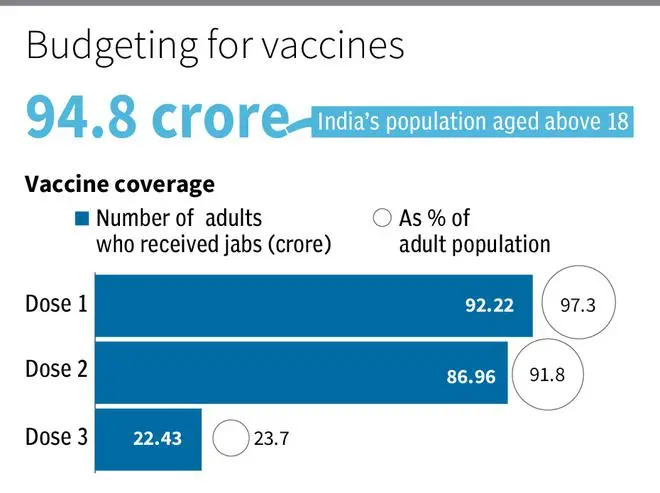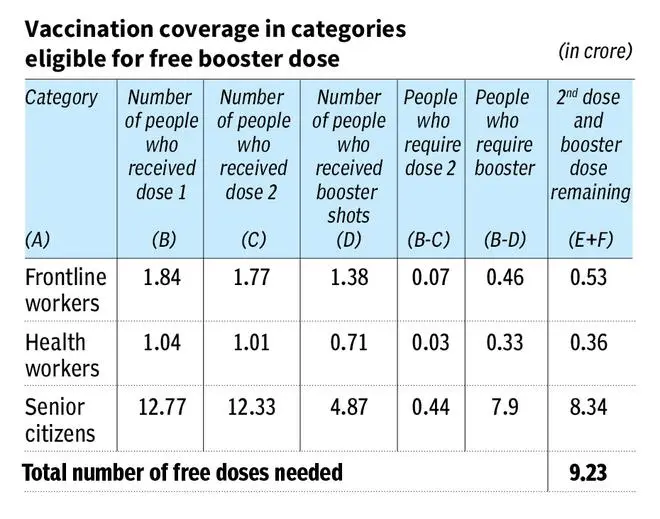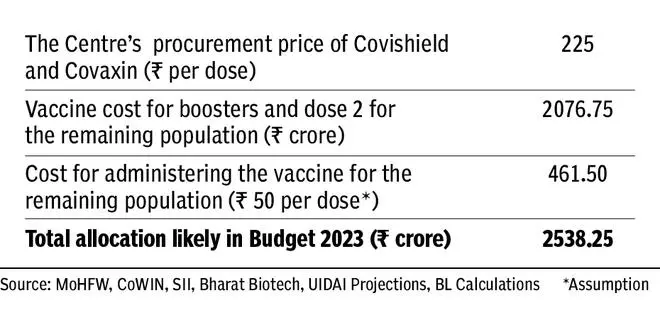Two years ago, while India was battling with a deadly second wave of the pandemic, mass vaccinating the eligible population was the priority. It is not surprising that the Budget for FY22 saw an allocation of ₹35,000 crore, which was further revised to ₹39,000 crore, to vaccinate the masses. The vaccine Budget, however, shrunk to ₹5,000 crore in FY23, since many people have already had the jabs.
Against this background, how much will the Centre allocate for Covid vaccines in FY24? We looked at data to draw an estimate.

Going by the UIDAI projections, there are around 94.77 crore people in India aged above 18. The data from the Ministry of Health and Family Welfare, as of January 10, says that 97 per cent of people from this category have taken at least one dose of the Covid vaccine and 91 per cent are fully vaccinated. However, only 24 per cent of India’s total adult population, has received a booster dose. This means the government’s priority at present will be to administer booster doses to the population.
Booster doses in India are administered for free only for people belonging to three categories — health workers, frontline workers and senior citizens (people above 60). The Centre has to bear the cost of vaccinating only those in these categories who are yet to receive the booster dose.

Vaccine cost
Assuming that everyone in these categories, who have had the first dose goes for the booster dose, then the Centre will have to administer vaccines to 9.2 crore people. Going by these numbers, the government will need 9.2 crore doses of vaccines. According to the Bharat Biotech and Serum Institute of India spokespersons, the Centre procures a dose of Covaxin and Covishield at ₹225 each. The vaccine cost for booster doses, therefore, comes to ₹2,076.71 crore.

We also assumed an overhead of ₹50 per vaccine, as administrative charges, which comes up to an additional ₹461.5 crore. So, to vaccinate the remaining eligible population, the Centre would require approximately ₹2,538 crore.
However, experts think that allocation need to be as high as last year. “The government should reserve ₹5,000 crore [for vaccines] in case of a potential epidemic,” says philanthropist and orthopedician Sharan Patil, weighing in on the topic. “If this allocation happens, the Centre can use it and, if it doesn’t, it can always be reallocated for other purposes. The allocation should primarily be used towards buying the vaccines, and they should keep the companies that manufacture the vaccines on high alert.
Vidya Mahambare, Professor of Economics and Director of Research, Great Lakes Institute of Management, Chennai, thinks that the allocation may be much lesser than last year’s ₹5,000 crore. “The government is unlikely to allocate any significant amount for Covid vaccines in this Budget. There is sufficient stock of vaccines available and any additional if required can be procured later,” she says.
Free booster dose
However, if the Centre decides to provide free boosters to all adults in the country, the way it was done for 75 days ago in July 2022, it would need another 60.58 crore vaccine doses, resulting in an additional expenditure of ₹16,650 crore. But given the reducing severity of cases, this may not be necessary.







Comments
Comments have to be in English, and in full sentences. They cannot be abusive or personal. Please abide by our community guidelines for posting your comments.
We have migrated to a new commenting platform. If you are already a registered user of TheHindu Businessline and logged in, you may continue to engage with our articles. If you do not have an account please register and login to post comments. Users can access their older comments by logging into their accounts on Vuukle.